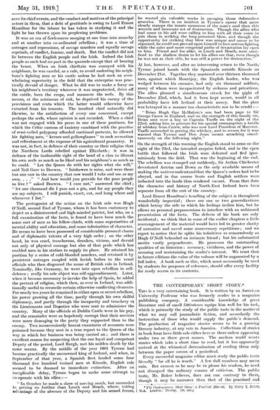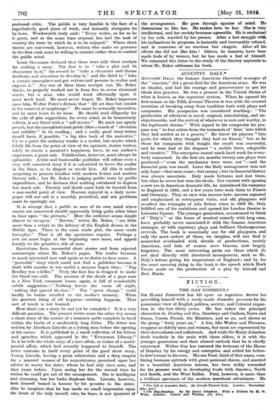THE CONTEMPORARY SHORT STORY.*
This is a very entertaining book. It is written by an American University Professor who was formerly reader to a magazine publishing company. A considerable knowledge of great literature and of small litterateure equips him well for his task, which is primarily the study of the public taste in the matter of what we may call journalistic fiction, and secondarily the instruction of those who would supply the public's demand. The production of magazine stories seems to be a growing literary industry, at any rate in America. Collections of stories in book form have little sale either here or there unless appearing under two or three great names. The modern world wants stories which take a short time to read, but it has apparently arrived at the whimsical determination of reading them only between the paper covers of a periodical
Every successful magazine editor must study the public taste literally " for all he is worth." A few dull numbers may mean ruin. But earnest as he may be to please his readers, he need not disregard the ordinary canons of criticism. The public taste, Mr. Baker believes, does not run contrary to them, though it may be narrower than that of the practised and •
• The Contemporary Mort Storm : a Practical Mamma. DS Harry T. Dater.
V.A. Loudon: 115trop. nct.J
professed critic. The public is very humble in the face of a superlatively good piece of work, and instantly abrogates its by-laws. Wordsworth truly said : " Every writer, so far as he is great, and at the same time original, has had the task of creating the taste by which he is to be enjoyed." Where short stories are concerned, however, writers who make no pretence to the first rank must be willing to content rather than to control the public mind.
Louis Stevenson declared that there were only three receipts for making a story. The first is to " take a plot and fit characters to it," the second to "take a character and choose incidents and situations to develop it," and the third to " take a certain atmosphere and get actions and persons to realize and express it." Any one of these three receipts can, Mr. Baker thinks, be properly worked out in from five to seven thousand words, but a man who would work effectually upon it must work hard. He must never forget, Mr. Baker impresses upon him, Walter Pater's dictum that "All art does but consist in the removal of surplusage." He must be naturally inventive, and he must learn to be terse. He should read diligently for the sake of plot suggestions, for every mind, as he humorously reflects, is not fitted with a " self-starter." He must not openly preach, but the unsophisticated public likes a touch of " elevation and nobility" in its reading; and a really good story-writer should have, if possible, "a big idea back of the narrative." Up to a point the ordinary reader is a realist, but stories which falsify life from the point of view of the optimist, stories written solely to create a moment's happiness, have, in our author's experience, a great sale. Falsification, however, must always be optimistic. A wise and businesslike publisher will refuse even a very well conceived story if it is calculated to leave the reader in the blues, or to disgust or revolt him. All this is rather surprising to persona familiar with modern fiction and modern literary talk ; but Mr. Baker is judging public taste by public expenditure, and he declares that nothing calculated to depress has much sale. Poverty and death must both be treated from a non-sordid point of view. Horrors enjoyed in a daily news- paper will not sell in a monthly periodical, and sex problems must be sparingly set.
It is strange that a public so sure of its own mind where stories are concerned should apparently bring quite other ideas to bear upon " the pictures." Here the audience seems simple almost to savagery. " Movies," writes Mr. Baker, " are little more than a return to the infancy of the English drama in the Middle Ages. There is the same crude plot, the same crude horseplay." That is all the spectators require. Perhaps a new art must begin at the beginning once more, and appeal frankly to the primitive side of man.
Quotations from successful short stories and from rejected manuscripts adorn Mr. Baker's pages. The reader becomes so much interested now and again as to desire to hear more. A "powerful" story which could not find a publisher because it dealt with murder in too sordid a manner began thus : " Pug Bradley was a killer." Truly the first line is designed to make the blood run cold. The account of the death of a poor man in a New York tenement house, again, is full of wonderfully subtle suggestion—" Nothing leaves the room all night, ' nothing that opened the door.' " The " great change" could hardly be better recalled to the reader's memory. When the greatest thing of all happens—nothing happens. That sort of touch is not learned.
How short can a story be and yet be complete P It is a very difficult question. The present writer came the other day across a short story of the nature of a romance quite complete in itself within the limits of a moderately long letter. The letter was written by Abraham Lincoln as a young man before the opening of his career. It is published in a small collection of his letters and speeches which appeared in the " Everyman Library." In it he tells the whole story of a love affair, or rather of a matri- monial affair, which had recently happened to himself. The letter contains in itself every point of the good short story. Young Lincoln, having a great admiration and a deep respect for a married woman of his acquaintance, promised upon her advice to marry her sister, whom he had only once Been, and that years before. Upon seeing her for the second time he wishes he could get out of the arrangement. She is intelligent end charming, but her looks displease him. Lincoln, however, feels himself bound in honour by his promise to the sister. Also he imagines that he has made no small impression upon the heart of the lady herself, who, he fears, is not ignorant of the arrangement. He goes through agonies of mind. He determines to like her. He makes love to her. She is very intellectual, and her society becomes agreeable. He is enchained by her talk, repelled by her person. After a last struggle with his inclinations he proposes, is instantly and irrevocably refused, and is conscious of no emotion but chagrin. After all his efforts she did not like him ! Others, he laments, have been made fools of by -women, but he has made a fool of himself. We commend this letter to the study of the literary aspirants to whom Mr. Baker addresses his book.



































 Previous page
Previous page